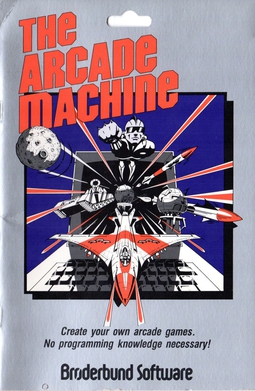Top Qs
Timeline
Chat
Perspective
The Arcade Machine
1982 video game From Wikipedia, the free encyclopedia
Remove ads
The Arcade Machine is a game creation system written by Chris Jochumson and Doug Carlston for the Apple II and published by Broderbund in 1982.[1] Louis Ewens ported it to Atari 8-bit computers.[1] Broderbund ran a contest from January–June 1984 where the best user-created game was awarded a prize of $1,500 in hardware and software.[2] Jochumson also wrote Track Attack for Broderbund.
Remove ads
Gameplay
The game allows players to create alien attacks like those seen in Galaxian. The inbuilt editor allows players to: design/animate enemies, players and explosions; give enemies instructions on moving/firing; drawing backgrounds/title screens, creating sound effects/music, and setting various gameplay rules. Finished games can be saved to a self-booting disk to allow them to run without this program.[3]
Remove ads
Reception
Summarize
Perspective
John F. Besnard reviewed the game for Computer Gaming World, and stated that "The product itself provides a tremendous amount of power to the user. Try a few of the demo games supplied on the back of the disk to see the versatility potential of the product."[4]
The New York Times described the game as a "hierophant" due to giving non-programmers the ability to create games; furthermore, the publication suggested that with a bit of aesthetic improvement, The Arcade Machine would "be a game one can play almost forever".[5]
In 1984, InfoWorld deemed it a "fabulous program," and compared it favourably to Pinball Construction Set.[2] InfoWorld's Essential Guide to Atari Computers cited it "a real tour de force".[6]
Steve Panak of ANALOG Computing wrote, "The Arcade Machine is not for the weak of stomach, nor for the weak of mind. Complexity is a key word here. However, despite its complexity, the program is surprisingly user-friendly, thanks to excellent documentation." In the conclusion he warned, "Many, many, many hours are needed to create and hone your game to perfection-and that's if you're not a perfectionist."[7]
The game was "a best seller", according to the September 1984 issue of Creative Computing.[8]
Remove ads
References
External links
Wikiwand - on
Seamless Wikipedia browsing. On steroids.
Remove ads

